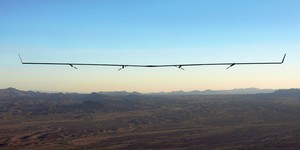SpaceX applies for globe-enveloping sat broadband licence
November 21, 2016 | 10:30
Companies: #internet-connection #spacex

Tesla and SpaceX founder Elon Musk has confirmed that he is forging ahead with a plan to place more than 4,000 satellites in low Earth orbit (LEO) in a bid to provide a globe-spanning broadband network.
In documentation filed last week, Musk's Space Exploration Technologies Corporation - SpaceX for short - formally applied for governmental permission to launch a total of 4,425 satellites into orbits ranging from 714 miles to 823 miles above the Earth. Representing more than the total number of man-made satellites currently in orbit, SpaceX plans to use the hardware to provide broadband connectivity across the globe - starting with an 800-strong satellite network to cover the United States and outlying islands.
The project, first announced early 2015, aims to address issues with existing satellite broadband networks in a variety of ways. Chief among these is making it affordable, while SpaceX has also promised that the network will have considerably lower latency - potentially sub-30ms - than existing satellite connectivity offerings as a result of the devices being in a low Earth orbit (LEO). All told, the company is thought to be putting around £8.11 billion into the project.
SpaceX's network follows on from a plan unveiled by Google in June 2014 to launch 180 microsatellites, a plan seemingly sidelined by the advertising giant in favour of balloon and drone based connectivity at a considerably lower capital expenditure.
SpaceX's application does not reveal a planned launch date.
In documentation filed last week, Musk's Space Exploration Technologies Corporation - SpaceX for short - formally applied for governmental permission to launch a total of 4,425 satellites into orbits ranging from 714 miles to 823 miles above the Earth. Representing more than the total number of man-made satellites currently in orbit, SpaceX plans to use the hardware to provide broadband connectivity across the globe - starting with an 800-strong satellite network to cover the United States and outlying islands.
The project, first announced early 2015, aims to address issues with existing satellite broadband networks in a variety of ways. Chief among these is making it affordable, while SpaceX has also promised that the network will have considerably lower latency - potentially sub-30ms - than existing satellite connectivity offerings as a result of the devices being in a low Earth orbit (LEO). All told, the company is thought to be putting around £8.11 billion into the project.
SpaceX's network follows on from a plan unveiled by Google in June 2014 to launch 180 microsatellites, a plan seemingly sidelined by the advertising giant in favour of balloon and drone based connectivity at a considerably lower capital expenditure.
SpaceX's application does not reveal a planned launch date.

MSI MPG Velox 100R Chassis Review
October 14 2021 | 15:04









Want to comment? Please log in.